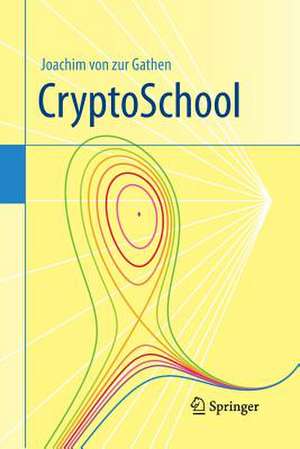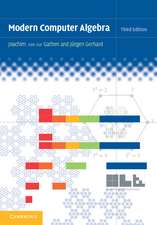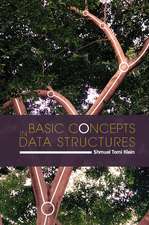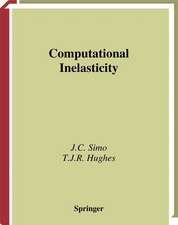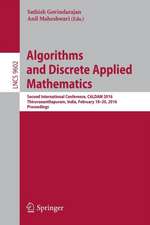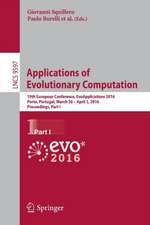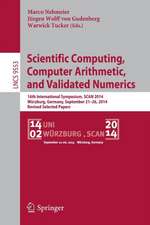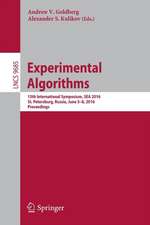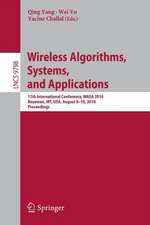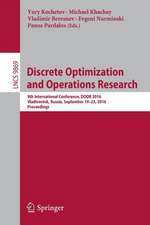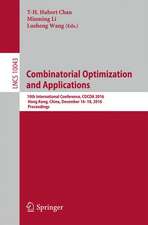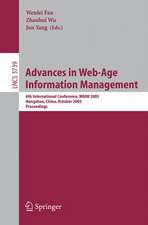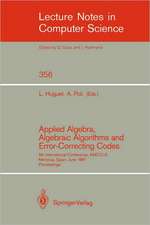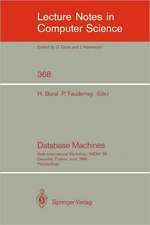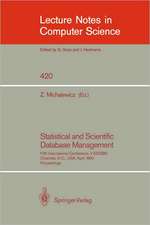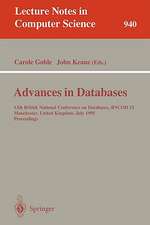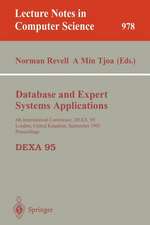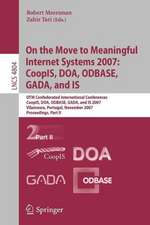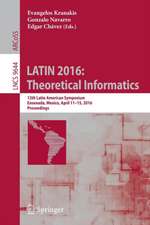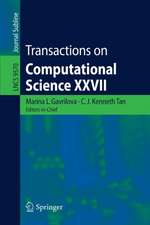CryptoSchool
Autor Joachim von zur Gathenen Limba Engleză Paperback – 23 aug 2016
This text, based on lecture notes from the author’s many courses on the art of cryptography, consists of two interlinked parts. The first, modern part explains some of the basic systems used today and some attacks on them. However, a text on cryptology would not be complete without describing its rich and fascinating history. As such, the colorfully illustrated historical part interspersed throughout the text highlights selected inventions and episodes, providing a glimpse into the past of cryptology.
The first sections of this book can be used as a textbook for an introductory course to computer science or mathematics students. Other sections are suitable for advanced undergraduate or graduate courses. Many exercises are included. The emphasis is on providing reasonably complete explanation of the background for some selected systems.
| Toate formatele și edițiile | Preț | Express |
|---|---|---|
| Paperback (1) | 304.66 lei 6-8 săpt. | |
| Springer Berlin, Heidelberg – 23 aug 2016 | 304.66 lei 6-8 săpt. | |
| Hardback (1) | 299.78 lei 39-44 zile | |
| Springer Berlin, Heidelberg – 28 noi 2015 | 299.78 lei 39-44 zile |
Preț: 304.66 lei
Preț vechi: 380.82 lei
-20% Nou
Puncte Express: 457
Preț estimativ în valută:
58.31€ • 60.65$ • 48.87£
58.31€ • 60.65$ • 48.87£
Carte tipărită la comandă
Livrare economică 13-27 martie
Preluare comenzi: 021 569.72.76
Specificații
ISBN-13: 9783662501436
ISBN-10: 3662501430
Pagini: 876
Ilustrații: XII, 876 p. 186 illus., 97 illus. in color.
Dimensiuni: 155 x 235 x 53 mm
Greutate: 1.22 kg
Ediția:Softcover reprint of the original 1st ed. 2015
Editura: Springer Berlin, Heidelberg
Colecția Springer
Locul publicării:Berlin, Heidelberg, Germany
ISBN-10: 3662501430
Pagini: 876
Ilustrații: XII, 876 p. 186 illus., 97 illus. in color.
Dimensiuni: 155 x 235 x 53 mm
Greutate: 1.22 kg
Ediția:Softcover reprint of the original 1st ed. 2015
Editura: Springer Berlin, Heidelberg
Colecția Springer
Locul publicării:Berlin, Heidelberg, Germany
Cuprins
1 Introduction.- 2 Basic cryptosystems.- A Classical cryptology.- 3 The RSA cryptosystem.- B Key addition and modular arithmetic.- 4 Group cryptography and discrete logarithms.- 5 Elliptic curves.- C Breaking the unbreakable.- 6 Differential and linear cryptanalysis.- 7 Hash functions.- D Codebooks.- 8 Signatures.- 9 Security and reductions.- E Steganography.- 10 Identification and authentication.- F Transposition ciphers.- 11 Random generation.- G Some cryptographers.- 12 Proof systems and zero knowledge.- H People using cryptography.- 13 Integral lattices.- I The Zimmermann telegram.- 14 Quantum computation.- J Enigma, Turing, and Colossus.- 15 The computer algebra toolbox.- List of notation and sources of quotations, images, and ornaments.- Bibliography.- Index.
Recenzii
“The book is an excellent and very comprehensive introduction to cryptography. Based on lectures the author has been giving on the art of cryptography, it is suitable as a basis for a two-semester graduate or advanced undergraduate course for students in mathematics, computer science, or engineering. Rigorous arguments and proofs are given for lemmas, theorems, etc, which also distinguishes the book from many other introductory books on cryptography. Every chapter closes with a collection of exercises … .” (Wilfried Meidl, zbMATH 1350.94006, 2017)
“The book under review is a very nice and enjoyable introduction to cryptographic science (cryptology). … audience is advanced undergraduate or graduate students in mathematics, computer science or engineering (albeit with a theoretical slant), and there are plenty of examples, exercises and problems to be worked out. The style of the exposition is clear and the details provided are sufficient, without being overwhelming. … Furthermore, the contents are more than enough for a two-semester course.” (Luca Giuzzi, Mathematical Reviews, June, 2016)
“The work is an important contribution to the literature in that it is more detailed, abundantly illustrated, and more clearly explained and thorough than many other accounts. The text describes some of the most important systems in detail … and provides detailed backgrounds for these topics as well. Each of these important areas is explained and demonstrated for those who lack knowledge in these aspects.” (G. Mick Smith, Computing Reviews, computingreviews.com, May, 2016)
“The book is intended for advanced undergraduates or beginning graduate students … . dedicates significant space to discussing theoretical aspects of security, including rigorous descriptions of the difference between axiomatic and empirical security … . CryptoSchool is very ambitious in its attempts to provide a self-contained overview of the past, present, and future of cryptography and largely succeeds at its goals.” (Allen Stenger, MAA Reviews, maa.org, May, 2016)
“The book under review is a very nice and enjoyable introduction to cryptographic science (cryptology). … audience is advanced undergraduate or graduate students in mathematics, computer science or engineering (albeit with a theoretical slant), and there are plenty of examples, exercises and problems to be worked out. The style of the exposition is clear and the details provided are sufficient, without being overwhelming. … Furthermore, the contents are more than enough for a two-semester course.” (Luca Giuzzi, Mathematical Reviews, June, 2016)
“The work is an important contribution to the literature in that it is more detailed, abundantly illustrated, and more clearly explained and thorough than many other accounts. The text describes some of the most important systems in detail … and provides detailed backgrounds for these topics as well. Each of these important areas is explained and demonstrated for those who lack knowledge in these aspects.” (G. Mick Smith, Computing Reviews, computingreviews.com, May, 2016)
“The book is intended for advanced undergraduates or beginning graduate students … . dedicates significant space to discussing theoretical aspects of security, including rigorous descriptions of the difference between axiomatic and empirical security … . CryptoSchool is very ambitious in its attempts to provide a self-contained overview of the past, present, and future of cryptography and largely succeeds at its goals.” (Allen Stenger, MAA Reviews, maa.org, May, 2016)
Notă biografică
Joachim von zur Gathen has taught about fifty courses on various topics in cryptology. His lively and interactive style has encouraged several original contributions by students throughout the book. His research is in cryptology, computer algebra, finite fields, algorithmics, and complexity theory.
The author has held professorships at the universities of Toronto, Paderborn, and Bonn, each for more than a decade. He is now retired (and active). Visiting professorships include Australia (Canberra, Sydney), Chile (Santiago, Concepción), Germany (Saarbrücken), South Africa (Johannesburg), Spain (Alcalà, Santander), Switzerland (ETH and Universität Zürich), Uruguay (Montevideo), and USA (Berkeley).
He is founder and was editor-in-chief for 25 years of the journal computational complexity, and was on the editorial boards of the journals Codes and Cryptography, Finite Fields and Their Applications, Journal of Symbolic Computation, and SIAM Journal of Computing.He is listed in various editions of Who's Who in the World.
His previous work includes the book "Modern Computer Algebra" that has been called "the bible of computer algebra" and has been cited in over 2000 articles.
The author has held professorships at the universities of Toronto, Paderborn, and Bonn, each for more than a decade. He is now retired (and active). Visiting professorships include Australia (Canberra, Sydney), Chile (Santiago, Concepción), Germany (Saarbrücken), South Africa (Johannesburg), Spain (Alcalà, Santander), Switzerland (ETH and Universität Zürich), Uruguay (Montevideo), and USA (Berkeley).
He is founder and was editor-in-chief for 25 years of the journal computational complexity, and was on the editorial boards of the journals Codes and Cryptography, Finite Fields and Their Applications, Journal of Symbolic Computation, and SIAM Journal of Computing.He is listed in various editions of Who's Who in the World.
His previous work includes the book "Modern Computer Algebra" that has been called "the bible of computer algebra" and has been cited in over 2000 articles.
Textul de pe ultima copertă
This book offers an introduction to cryptology, the science that makes secure communications possible, and addresses its two complementary aspects: cryptography — the art of making secure building blocks — and cryptanalysis — the art of breaking them. The text describes some of the most important systems in detail, including AES, RSA, group-based and lattice-based cryptography, signatures, hash functions, random generation, and more, providing detailed underpinnings for most of them. With regard to cryptanalysis, it presents a number of basic tools such as the differential and linear methods and lattice attacks.
This text, based on lecture notes from the author’s many courses on the art of cryptography, consists of two interlinked parts. The first, modern part explains some of the basic systems used today and some attacks on them. However, a text on cryptology would not be complete without describing its rich and fascinating history. As such, the colorfully illustratedhistorical part interspersed throughout the text highlights selected inventions and episodes, providing a glimpse into the past of cryptology.
The first sections of this book can be used as a textbook for an introductory course to computer science or mathematics. Other sections are suitable for advanced undergraduate or graduate courses. Many exercises are included. The emphasis is on providing a (reasonably) complete explanation of the background for some selected systems.
< Joachim von zur Gathen has held professorships at the universities of Toronto, Paderborn, and Bonn, each for more than a decade. He is now retired (and active). His numerous visiting professorships were in Australia, Chile, Germany, South Africa, Spain, Switzerland, Uruguay, and USA. He is founder and was editor-in-chief for 25 years of the journal computational complexity, and was on the editorial boards of several other journals. He is listed in various editions of Who's Who in the World.
This text, based on lecture notes from the author’s many courses on the art of cryptography, consists of two interlinked parts. The first, modern part explains some of the basic systems used today and some attacks on them. However, a text on cryptology would not be complete without describing its rich and fascinating history. As such, the colorfully illustratedhistorical part interspersed throughout the text highlights selected inventions and episodes, providing a glimpse into the past of cryptology.
The first sections of this book can be used as a textbook for an introductory course to computer science or mathematics. Other sections are suitable for advanced undergraduate or graduate courses. Many exercises are included. The emphasis is on providing a (reasonably) complete explanation of the background for some selected systems.
< Joachim von zur Gathen has held professorships at the universities of Toronto, Paderborn, and Bonn, each for more than a decade. He is now retired (and active). His numerous visiting professorships were in Australia, Chile, Germany, South Africa, Spain, Switzerland, Uruguay, and USA. He is founder and was editor-in-chief for 25 years of the journal computational complexity, and was on the editorial boards of several other journals. He is listed in various editions of Who's Who in the World.
Caracteristici
Basic and advanced cryptographic methods with complete underpinnings Modern approach with security reductions throughout the text Colorful history of cryptography with over 100 illustrations, half of them in color Suitable for beginners Includes supplementary material: sn.pub/extras
